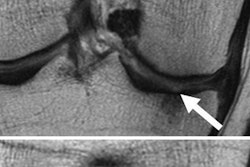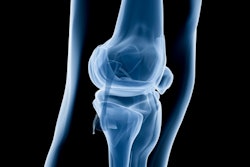
CHICAGO - A study using MRI has found that if overweight or obese individuals shed more than 10% of their body weight, the degeneration of knee cartilage is slowed, researchers reported at RSNA 2015.
"Substantial weight loss not only slows knee joint degeneration -- it also reduces the risk of developing osteoarthritis," said lead author Dr. Alexandra Gersing from the department of radiology and biomedical imaging at the University of California, San Francisco.
Gersing presented results from the four-year, retrospective study at a press conference at this week's RSNA annual meeting.
The researchers found that weight loss had a protective effect on knee cartilage, and that it may slow or prevent the development of osteoarthritis, she said.
"Degenerative joint disease is a major cause of pain and disability in our population, and obesity is a significant risk factor," Gersing noted. "Once cartilage is lost in osteoarthritis, the disease cannot be reversed."
Osteoarthritis Initiative
Using MRI, the researchers evaluated 506 patients who were enrolled in the Osteoarthritis Initiative, a U.S. research effort focused on preventing and treating knee osteoarthritis. The patients were approximately 62 years old, 60% were women, and their average body mass index was 30.2 kg/m2.
Gersing said 177 of these patients lost 5% to 10% of their body weight, while 76 patients lost more than 10% of their body weight. The 253 patients who didn't lose weight were used as controls in calculating the impact of weight loss. Heart failure and cancer patients were excluded from the study.
"Through T2 relaxation time measurements from MRI, we can see changes in cartilage quality at a very early stage, even before it breaks down," she said.
The researchers observed a 0.9 increase in T2 measurements over four years in patients who had no weight loss, and they saw about the same increase in patients who lost 5% to 10% of body weight. But in those who lost more than 10%, they found an increase of less than 0.4 -- a 55.6% reduction in the rate of cartilage layer damage.
"Less T2 increase over four years equals less cartilage degeneration," Gersing said.
The effect of weight loss was even more pronounced when looking at the medial tibial cartilage. The T2 increase was approximately 1.1 among those who did not lose weight and 0.8 among those who lost 5% to 10%, compared with an increase of barely 0.1 among those who lost more than 10% -- a reduction of 90.8% in the rate of degenerative changes.
Weight loss also correlated with knee pain, Gersing said. Knee pain based on the Western Ontario and McMaster Universities Osteoarthritis Index (WOMAC) increased slightly in patients who did not lose weight and decreased in those who lost weight.
Although the findings are retrospective, they still may offer enough information so doctors can again try to persuade overweight patients of the benefits of losing excess pounds, said press briefing moderator Dr. Salomao Faintuch, clinical director of vascular and interventional radiology at Beth Israel Deaconess Medical Center and an assistant professor of radiology at Harvard Medical School.
"Even though we like prospective studies better to provide scientific evidence, the retrospective design is not really a problem in this study," he said. "It is obvious and well-known that losing weight helps people in so many different ways. The real novelty of this study is showing that how much weight you lose really makes a difference. Losing a little bit can make things better, losing even more makes it even better than that.
"It is important to be able to quantify that," he said. "If you lose weight, your joints are going to do better."




















